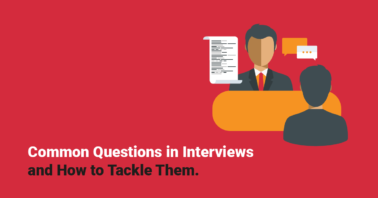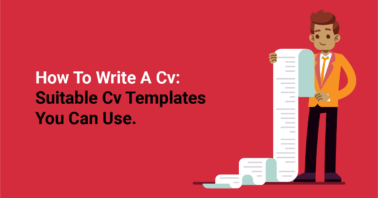Most employers make it compulsory for interested candidates to send them a CV and a Cover letter. A cover letter is an important document supporting a candidate’s CV, which gives a potential employer more information about the candidate. Regrettably, most candidates do not understand the value of a Cover letter. Worst still, most candidates do not know how to write one and assume it’s a document forwarded with each application.
A cover letter should be a well-written, well-thought-out, and customized document that compels the employer to read it and consider the candidate. It is wise to note that a cover letter is needed at each stage of one’s career, regardless of whether you are a fresh graduate or a seasoned career individual.
This article showcases the value of a cover letter, shows you how to write one, and shows you what details must go into the document. See the tips below on how to use a cover letter.
Table of Contents
How to prove to the employer that you are the best candidate
The cover letter gives you a platform to display your skills and experience in detail, unlike the CV. While the CV summarises your qualifications and work experience, the cover letter allows you to blow your career trumpet and convince the employer that you are their best shot at attaining their business objectives.
For instance, where the job advert requires that the ideal candidate possess managerial and supervision skills. The cover letter provides the perfect platform to showcase previous experience by stating how you managed team dynamics, set team targets, and achieved recognition, reward, and discipline within the team, among other HR functions. You can also state how you contributed to the team’s success by encouraging teamwork, healthy competition and boosting morale. Listing such attributes on your cover letter gives the employer a clear indication that you know exactly what they are looking for, and that you see how your skills fit in the role.
You can also specifically elaborate on your achievements and successes with tangible data that clearly paints the picture for the reader. For instance, if you are looking for a sales job, and the advert states that the incumbent should open and manage remote markets. You can, therefore, mention how you launched and managed new branches. You should be able to show how this experience will be relevant to the new employer.
How to talk about salary in the cover letter
Sometimes, employers request candidates to state their current/previous remuneration and what they expect. Employers ask for these details for various reasons. Some employers use it as a filter for candidates since they already have existing budgets for the role. Others want to know where they fall in the market reward scale and the value attached to certain candidates in a certain industry. The best way to provide the required information is through the Cover letter because it gives you the space to state your conditions. For instance, you can say. “my current gross salary is Kshs.55,000. I expect a 15% – 40% increase on the same, based on the duties and responsibilities of the role and possibility of other benefits.”
That being said, it is evident that you need a fresh cover letter for each job application. You can have a general document that lists your achievements, experience, and skills, but you will need to customize it each time to suit a particular job advert. Updating your Cover letter with every application makes you relevant and increases your chances of getting an interview.
How should you send a Cover letter?
With the changing trends in technology, most job applications have switched from manual to online applications. This means that most employers require applications to be made online. To ensure that your cover letter is read by the employer, copy and paste it on the email body, and also send an attachment of the same. This way, your Cover letter will be the first thing the employer will see when they open their email. This is more effective than the cliché ‘Kindly find attached my CV and Cover letter’ phrase used by most candidates.
What is the difference between a cover letter and an application letter?
The truth is, there is no difference between a cover letter and an application letter. Despite the differing names, the purpose of these documents is the same. A cover letter is a document sent alongside a CV during a job application process.
Another point to note is that the length of a cover letter matters a lot. It should briefly summarise why you are the most suitable candidate, not an opportunity to give your whole work experience history. State experience, skills and qualifications that are relevant to the role you are applying for only.
In conclusion, make your cover letter attractive and interesting for potential employers. Confide in your skills, experience, logic, and relevance to the role they are looking to fill. This is the only way to attract and keep their interest in you as a candidate.
Why Is A It Necessary?
You have the perfect CV, the right format, and relevant details showcasing your skills and selling your unique strengths. How about a cover letter? It is meant to act as a sales pitch, summarizing all the skills, experience and capabilities listed on the CV. It allows you to tell a story. It should be brief and straight to the point. Most candidates make the mistake of copy-pasting the same cover letter for all the jobs they applied for. This is a huge error, and it’s where most candidates go wrong. A cover letter adds focus to your resume.
In most job adverts, one must send a CV and cover letter. Unfortunately, most candidates don’t know the purpose of this letter. They treat a cover letter as just any other document required in the application process. For those who know the reason for having one, they make mistakes when sending out the application, and as a result, employers and recruiters end up not reading them.
This article explains the reasons for accompanying a CV with a cover letter. Understanding what to write is only half the battle; it is necessary to know how to send this important document so that employers don’t have a choice but to read it. This way, you’ll increase the chances of getting an interview.
The Importance of A Cover Letter
- It allows you to customize your application to the job you are applying to. This explains why using the same cover letter over and over never lands you the job. Always read and understand the job you are applying for and use it as a guide in drafting your cover letter.
- Ensure that your cover letter is the perfect tool to explain yourself to the employer. Describe what makes you fit into the role and how your skills match the job and the company you want to work for. It should never be copied and pasted into your CV.
- Your cover letter makes your prospective employer want to know more about you. Use it as a teaser to engage the employer’s interest so they are interested in checking out what you have in the CV. Present your opportunities and accomplishments without giving it all out.
- Employers dislike long paragraphs, so ensure you follow the following principles to write a great cover letter!
- Be brief
- Identify yourself
- Exhibit your passion
- Sell your qualifications
- Make it easy to read
Whether you are a fresh graduate or a senior-level career individual, you need a cover letter. There’s no exception since employers and recruiters expect to see one. Here is how to get the important document to work for you;
Information to Include In Cover Letters
Addressing
Your full name, home address and the application date should be at the top. Then, state the name or job title, company name and address of the employing organisation. Address the letter stating the person’s name; if unknown, use the Sir/Madam title. The subject line should indicate the job position you’re applying for and the job reference number (if given). Ensure proper pronunciation and punctuation as it showcases your writing abilities.
Introductory paragraph
The first paragraph should state why you are writing to them. If it is advertised, mention the position title stating where it was advertised. An easy way to start this paragraph is by saying, “I write to you regarding the above position, as advertised on BrighterMonday.” You should also state the job position and your highest qualification for the job.
Main Body
It should be at least two to three paragraphs long. Summarize your experience and skills and respond to the position requirements in a few sentences. Highlight how specialized you are, your experience, and how you are the perfect match for the job. Paint a picture by giving examples stating precisely how you accomplished a given task, listing actions and the positive results of those actions. Remember always to sell yourself.
Closing Paragraph
- This is where you ask for an interview, showing your willingness to work for that particular company/organisation. It should also state how they can reach you, thanking the recipient for reading and reviewing your application. Finish the letter by adding a closing remark, either “yours sincerely” or “yours faithfully”. Leave a space for your signature, and then place your full name.
How to Send A Cover Letter
95% of employers will expect you to make an online application. With that in mind, how should you send a cover letter? For maximum impact, always copy and paste the it’s contents into the email’s body. You should copy-paste because it should be the first thing a recruiter reads when they open your email. And it’s a much better way of introducing yourself than having one line saying; please find attached my CV and cover letter.
From the above, you can see that you need a different cover letter for every job. It is okay to have a general one summarising your skills, achievements and strong points, but always try to tweak an application to fit an employer’s specific needs. No two jobs or employers are the same, even when they are from the same industry. Through the cover letter, you demonstrate the skills, attitude and expertise to perform the job as per the employer’s expectations. The employer’s expectations are outlined in the job description/advert.





